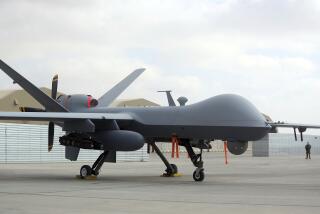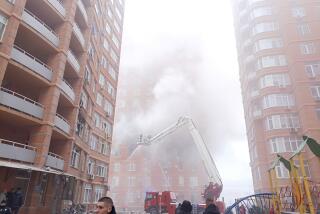U.S. Rules Out Bosnia Air Raids : Balkans: Administration, facing calls in Congress and military to hit missile batteries like one that downed pilot, cites fear of endangering U.N. peacekeepers held hostage.
- Share via
WASHINGTON — Despite calls from Congress and within the Air Force for air strikes to destroy missile batteries in Bosnia-Herzegovina such as the one that shot down a U.S. F-16 last week, the Clinton Administration has ruled out such action as long as Bosnian Serb forces hold United Nations troops hostage, officials said Friday.
President Clinton’s advisers considered proposals for military retaliation against the Serb rebels after Air Force Capt. Scott F. O’Grady was shot down last week but quickly concluded that would endanger the 146 U.N. hostages and damage U.S. ties with Britain and France, officials said.
“When you have other people’s troops on the ground, it would be inappropriate to put them in greater danger,” a White House official said. “The missions we are conducting over Bosnia are NATO missions; for the United States to make a unilateral decision to retaliate would be inappropriate as well.”
Several members of Congress, including Sens. John Kerry (D-Mass.) and Dianne Feinstein (D-Calif.), said after O’Grady’s rescue on Thursday that they favored retaliatory action against the Bosnian Serbs, if only to destroy the SA-6 surface-to-air missile battery that brought the 29-year-old pilot down.
And military officers said there is considerable sentiment in the Air Force for air strikes against Bosnian Serb radar and missile installations--to protect North Atlantic Treaty Organization pilots against being shot down again.
But Defense Secretary William J. Perry said there are other ways to protect fighters against missiles.
“A preemptive strike is only one of many ways of dealing with these,” he told reporters in Brussels, where he was attending a NATO meeting. He said Serb air defenses could be foiled either by electronic jamming or by pilot maneuvers.
“If my air commanders tell me that the only safe way to conduct a mission is to conduct a preemptive strike against ground radars first, then we will either get them the authority to do that or we will tell them they don’t have to do that mission,” Perry added.
Meanwhile, the White House announced that Clinton will honor O’Grady at a White House ceremony Monday.
“It will be a small, private meeting,” spokeswoman Mary Ellen Glynn said. O’Grady was scheduled to arrive in Washington from Aviano Air Base in Italy on Sunday afternoon.
Bosnian Prime Minister Haris Silajdzic came to the White House on Friday and asked Administration officials to break the U.N. arms embargo on Bosnia, but failed in his efforts.
*
“We leave the White House knowing that the position will not change in the near future, and that’s what we regret,” Silajdzic told reporters after meeting with Vice President Al Gore. “We shall have more suffering in Bosnia.
“We want to defend ourselves,” the Bosnian official said, asserting that the 3-year-old arms embargo, which critics say hamstrings the Muslim-led Bosnian government more than it does the generally better-armed Bosnian Serbs, had become “an instrument of genocide and a failure.”
White House Press Secretary Mike McCurry confirmed that Gore had reaffirmed the Administration’s position.
McCurry argued that, if the United States broke the U.N. arms embargo, U.N. peacekeeping troops would immediately withdraw from the country--requiring U.S. ground forces to both aid their exit and defend the Bosnian Muslims.
“If we were unilaterally taking responsibility for lifting the arms embargo, we would feel a moral responsibility to make sure that the Bosnian Muslims were not slaughtered in the aftermath,” McCurry said.
“We see in our strategic interest no reason to commit U.S. ground forces to take part in what would be a war between the Bosnian Muslims and the Bosnian Serbs,” he added.
*
The House of Representatives voted this week to prohibit the United States from participating in the arms embargo as part of a foreign aid bill. The measure has not been considered by the Senate, but Senate Minority Leader Tom Daschle (D-S.D.) predicted that the outcome there would be the same as in the House.
Clinton has said he will veto the bill if it comes to him in In Bosnia, the fate of the remaining U.N. peacekeepers held hremained uncertain Friday.
Workers for the International Committee of the Red Cross werehostages for the second day in a row, but a top U.N. official exfrom Belgrade, the Yugoslav and Serbian capital, that the detainees would be released soon.
“I think that the pace of release may begin to be more measured,” said Yasushi Akashi, U.N. special envoy to the former Yugoslav federation. He did not elaborate.
The Bosnian Serbs have released 232 U.N. peacekeepers but continue to hold 146 others; 86 Ukrainian peacekeepers have also been forced to remain in their camp by Bosnian government forces.
The United Nations said the Ukrainian peacekeepers were being blocked because of Bosnian government fears that they intended to withdraw from their base in Gorazde, leaving the city even more vulnerable to attacks by Serb guerrillas.
In neighboring Croatia, allies of the Bosnian Serbs in the breakaway region of Krajina launched a morning air raid against Bosnian Croat troops, who along with the Croatian army have been pounding Krajina Serb villages and an important supply route for more than a week.
U.N. peacekeepers reported two warplanes struck the Mt. Dinara area, in violation of a U.N. ban on such air attacks. The Bosnian Croat army confirmed that two Galeb ground-attack aircraft from an airfield north of Knin--the self-styled capital of the breakaway Krajina--bombed its “defense lines” on the mountain.
“There were no casualties or changes in front lines,” the army said.
U.N. officials said the air raid was probably intended to push back Croat forces, which have been hitting targets near Knin for the first time since Serbs in the region revolted against Croatia’s secession from the former Yugoslav federation in 1991.
“Over the last few days we have had repeated reports of shelling of villages somewhat close to Knin, by about [eight miles], which is the closest shelling has ever been reported to Knin,” U.N. Maj. William Taylor said.
*
In Zagreb, the Croatian capital, President Franjo Tudjman said Croatia wanted to peacefully re-integrate Krajina Serb territory into Croatia, but he warned that Croatia will resort to force if the two sides remain at loggerheads when the U.N. mandate in Croatia expires Oct. 31.
“It is up to the extremists whether there will be any new lightning attacks or not,” Tudjman said, a reference to Operation Lightning, the surprise attack last month by Croatian forces into the Serb-held Western Slavonia region of central Croatia.
The Croatian army regained control of the rebel-held territory in a 31-hour blitz across U.N. cease-fire lines beginning May 1.
McManus reported from Washington and Pine reported from Brussels. Times staff writer Dean E. Murphy, in Zagreb, also contributed to this report.
More to Read
Sign up for Essential California
The most important California stories and recommendations in your inbox every morning.
You may occasionally receive promotional content from the Los Angeles Times.











